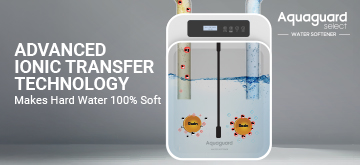
How to Protect Your Washing Machine from Hard Water Damage
PUBLISHED ON: 08-Sept-2025
If you live in an area with hard water, your washing machine faces an invisible but constant threat. Hard water has high levels of dissolved minerals like calcium and magnesium. Over time, these minerals form limescale inside your machine’s drum, heating elements, and pipes.
Eventually, you will see reduced cleaning efficiency, higher energy consumption, and a shorter appliance lifespan. Addressing hard water damage isn’t just about better laundry results but about protecting your investment and avoiding costly repairs.
Hard Water Damage Signs in Your Washing Machine
Spotting hard water damage early can save you time and money. Common warning signs include:
- Clothes feel stiff or rough after washing.
- White, chalky residue on laundry or inside the drum.
- The machine makes unusual noises during operation.
- Longer wash cycles or higher power bills due to reduced efficiency.
- Frequent breakdowns or clogged inlet valves.
The Role of a Washing Machine Water Softener
A washing machine water softener works by removing or neutralising the minerals responsible for hardness before water enters your machine. Most models use ion exchange technology, replacing calcium and magnesium ions with sodium or potassium ions, which do not cause limescale buildup.
Key benefits include:
- Extending the lifespan of your washing machine.
- Keeping clothes soft and free from residue.
- Reducing detergent usage.
- Preventing limescale in heating elements, improving energy efficiency.
Choosing the Right Hard Water Softener for Washing Machine Use
When selecting a hard water softener for washing machine protection, consider:
- Water hardness level – Get a test kit to measure your water’s mineral content.
- Type of washing machine – Ensure compatibility with front or top loaders.
- Space and installation – Decide between a compact, point-of-use unit or a whole-house system.
- Budget and maintenance – Factor in initial cost, salt refills, and servicing.
Recommended Water Softener Options:
1. Aquaguard Select AWS C-2500 DX Water Softener
Ideal for medium-sized homes, this model is designed to safeguard appliances like washing machines from hard water damage.
Key Features:
- Technology: Ion-exchange resin system replaces calcium and magnesium ions with sodium, preventing limescale buildup.
- Modes: Multiple regeneration modes optimise water and salt consumption.
- Features:
- Automated regeneration for hassle-free operation.
- Easy-to-read LCD display for monitoring water softening performance.
- IntelliMix Technology for precise water-softening balance.
- Benefit for Washing Machines: Extends lifespan by reducing mineral deposits in the drum, heating elements, and hoses.
2. Aquaguard Select AWS C-1200 Water Softener
Compact yet powerful, this model is best suited for households where space is limited but soft water is essential for appliance care.
Key Features:
- Technology: Efficient ion-exchange resin ensures a consistent soft water supply.
- Modes: Automatic regeneration mode for set-and-forget convenience.
- Features:
- Compact design for easy installation near the washing machine.
- Delivers continuous soft water to improve laundry results.
- Low-maintenance operation.
- Benefit for Washing Machines: Protects internal parts from scaling, ensuring better detergent performance and cleaner clothes.
Ways to Protect Your Washing Machine from Hard Water
Even with a water softener in place, following these extra steps can provide added protection:
- Clean the washing machine inlet filter – This catches sediment and small mineral particles before they enter the drum.
- Run a maintenance wash – Use hot water and a machine cleaner with no laundry inside to flush out buildup.
- Choose detergents made for hard water – These are formulated to work effectively in mineral-rich water.
Additional Tips to Prevent Hard Water Damage
- Clean the detergent drawer – Mineral deposits can clog detergent flow.
- Wipe the drum and door seal – Prevents residue and mould growth.
- Check inlet hoses and filters – Replace or clean if blocked.
- Schedule professional servicing – Annual check-ups keep your appliance in top condition.
These habits work alongside a washing machine water softener to keep your appliance running smoothly for years.
Final Thoughts
Protecting your washing machine from hard water damage is a two-step approach: treat the water before it enters the machine, and maintain the machine regularly. Installing a hard water softener for washing machine use, such as the Aquaguard Select AWS C-2500 DX or Aquaguard Select AWS C-1200, can significantly reduce limescale buildup, improve wash quality, and extend your machine’s lifespan.
A small investment today can save you from major repairs tomorrow and keep your laundry fresh, soft, and residue-free.
Frequently Asked Questions
Do I need a whole-house water softener or just one for my washing machine?
If your primary concern is laundry, a point-of-use washing machine water softener is sufficient. However, a whole-house system also protects other appliances like dishwashers and geysers.
Can a water softener improve detergent performance?
Yes. Soft water allows detergents to lather better, meaning you can use less while still achieving cleaner clothes.
How often should a washing machine water softener be maintained in hard water areas?
Check and refill the salt or cartridge as recommended by the manufacturer, usually every few months, to ensure consistent softening and protection from limescale build-up.
